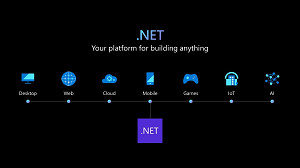Q&A
Jason Bock Explains What's New in .NET 7 APIs
Microsoft's .NET 7 is the current version of the .NET unified runtime, providing developers with flexibility and power for writing modern applications. .NET is constantly evolving, and with .NET 7 just about halfway through its first year (.NET 8 is coming in November), it features new APIs that developers might not be aware of.
.NET APIs in general are hard to keep track of, as the .NET API Catalog currently contains 963,086 APIs. And the Microsoft's .NET API browser shows well more than 100 for .NET 7 alone.
 [Click on image for larger view.] .NET (source: Microsoft).
[Click on image for larger view.] .NET (source: Microsoft).
To educate devs about the latest that are new to .NET 7 and especially useful, Jason Bock, MVP (C#) and staff software engineer at Rocket Mortgage, will be discussing what APIs have been added to .NET 7 and reviewing new features and APIs that you can use wherever .NET goes. He will share his insights with attendees of an Aug. 10 session titled "What's New in .NET 7 APIs" at the big, five-day, in-person Visual Studio Live! developer conference set for Aug. 7-11 in San Diego.
Specifically, attendees of the 75-minute session will:
- See what functionality .NET provides
- Understand new features in the latest version of .NET
- Gain insight in staying on top of new runtime versions
We caught up with Bock to learn more about his session in a short Q&A.
VisualStudioMagazine: What inspired you to present on the topic of .NET 7 APIs?
Bock: I've always been interested in the changes that happen in each new version of .NET. With .NET Framework, it wasn't easy to discover what was added, so I decided to find ways to obtain the deltas between versions. I felt like this was a worthwhile endeavour, so I ended up doing presentations on this to share this knowledge with other engineers and developers. With modern .NET versions, this information is much easier to obtain, but I feel like it's still beneficial to have a conversation around new APIs and how they work.
As an example, what is one especially significant change in .NET 7 APIs?
The biggest change is related to a feature called static abstract members in interfaces. Essentially, in .NET 7, you can define members on an interface that are abstract, which means that an implementing class has to provide an implementation for that member. Furthermore, you can also define operators with this new feature. This is heavily used with the notion of generic math," though this powerful feature that has worked its way in many ways in .NET 7.
How do these changes affect developers who are currently using .NET?
It depends on what version your application is currently at.
 "With every version of .NET, there are always new APIs added that may make your development life easier. You may be able to remove code you've written and use what's baked into .NET."
"With every version of .NET, there are always new APIs added that may make your development life easier. You may be able to remove code you've written and use what's baked into .NET."
Jason Bock, MVP (C#) and Staff Software Engineer at Rocket Mortgage
With every version of .NET, there are always new APIs added that may make your development life easier. You may be able to remove code you've written and use what's baked into .NET.
What are some of the benefits of using .NET 7 APIs?
There's two ways to answer this. As I mentioned in the previous answer, some of the additions may let you remove code you've written, or let you write code you weren't able to do before. The other benefit is the continual performance improvements .NET has provided with each new version. I highly recommend reading Stephen Toub's performance article on .NET 7. Even if you don't use any new APIs, it's likely you'll see some measurable improvements just by upgrading to the new version.
How can developers stay on top of new runtime versions?
You can get general information on .NET versions. If you have a question about a specific class or method, you can read the documentation. You can also see the source code with a nice user experience at this site. Finally, the release notes provide a wealth of information on what has changed between versions, included preview releases.
Note: Those wishing to attend the conference can save hundreds of dollars by registering early, according to the event's pricing page. The event organizer said: "Register for VSLive! San Diego by the Early Bird Deadline (July 14) to save up to $300 and secure your seat for intensive developer training in sunny Southern California!"
About the Author
David Ramel is an editor and writer at Converge 360.